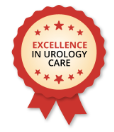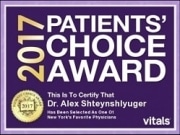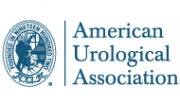Genital Wart Treatment in NYC for Men and Women
If you have any questions, to schedule a consultation, please contact us or call/text: 1-646-663-4125.
Treatment Options for Genital Warts at New York Urology Specialists

Many people have no symptoms from genital warts and do not need any treatment. If the warts are causing symptoms, medications and surgery are possible treatment options. Remember, genital warts may return after treatment.
There is no cure for the HPV virus itself. Genital wart removal gets rid of the wart and reduces but does not eliminate the risk of spread to your sexual partner. Wart removal does not cure you of HPV infection. The HPV vaccine Gardasil-9 may fight off an HPV infection and decrease the chances of wart recurrence or possibly passing the infection on to your partners.
There are several treatment options for genital warts, including complete removal of warts, freezing with cryoablation, and medications in the form of creams. In general, wart removal with surgical excision or laser is the most effective treatment with the least risk of recurrence. It can be performed conveniently in one visit. Cryoablation (freezing) typically requires 3-4 visits for each wart and is less effective. Medications are effective only in 40-60 percent of men and women and are associated with a higher frequency of recurrence.
Genital wart removal using excision and electrocautery and medical therapy using podofilox and imiquimod are the preferred treatment options for genital warts at New York Urology Specialists.
Genital Wart Removal in NYC
At New York Urology Specialists, we offer same-day genital wart removal. Schedule an appointment today.
We also perform comprehensive STD testing for other infections. We offer confidential appointments. Our prices are affordable with or without insurance. Call/text today: 1-646-663-4125 or make an appointment online.
Genital Wart Removal: Surgical Treatment for Genital Warts
Some of the surgical treatments for genital warts offered at New York Urology Specialists include:
Surgical Excision
This is the most effective one-time treatment with the least chance of recurrence and minimal scarring. The procedure is typically performed in our office under local anesthesia and takes less than 30 minutes. Wart removal is effective in all situations, including when cryotherapy has failed, or if there is a recurrence of genital warts after podofilox or imiquimod cream treatment.
Surgical excision is recommended for patients who have multiple warts or large warts. Excision is the treatment of choice in people who are unresponsive to other treatments. Cryotherapy and creams are typically ineffective for larger warts. Surgical removal of genital warts is also recommended in pregnant women to protect the baby from exposure during delivery.
Large visible genital warts are excised with scissors or scalpel. Electrocautery can be used to control minor bleeding. In many cases, no stitches are necessary. Wart removal also allows us to test for the presence of high-risk HPV strains that predispose to precancerous changes.
Electrocautery for Treatment of Genital Warts
An electric current is used to burn off warts. Electrocautery is also used to remove genital warts. There may be some swelling following the treatment. Most patients have minimal to no pain. Electrocautery is an effective treatment option similar to surgical excision. Typically, smaller warts are destroyed with electrocautery while larger ones are removed with a scalpel or with electrocautery.
The benefit of using electrocautery is that the heat destroys the virus at the margin of the wart and the recurrence rate is lower as a result as compared to the simple excision of the wart with a scalpel.
Electrocautery can be used in combination with a scalpel or surgical scissors to remove and ablate genital warts.
Electrocautery is the preferred method of genital wart destruction at New York Urology Specialists due to excellent efficacy, good control of bleeding, low rate of recurrence and lower cost compared to other methods such as CO2 laser, cryoablation, etc.
The procedure takes 5-30 minutes depending on the size of the wart. Multiple warts can be treated in one treatment.
Cryotherapy: Wart Freezing
This involves freezing the genital wart with liquid nitrogen. It usually requires multiple sessions even for small (5-10 mm or 1/3 of an inch) warts. There is no significant benefit in terms of scarring compared to other options including laser treatment and excision. Cryotherapy must be performed by trained providers because under- or over-treatment can lead to ineffective treatment or complications. Common side effects of the procedure include pain and blistering. Local anesthesia is given if a large genital wart is being treated. (link)
CO2 Laser
CO2 laser treatment of genital warts is an effective treatment option. This approach is reserved for large warts that are unresponsive to other treatments. The procedure may cause some scarring and pain. The effectiveness of laser treatment is similar to excision or electrocautery. However, laser treatment is typically more expensive than wart removal or electrocautery.
Medical Treatment for Genital Warts
Prescription creams for genital warts are partially effective. They may be prescribed for frequent recurrences. Do not use over-the-counter wart removal treatments for genital warts. The skin in the genital areas is moist and different from the skin of the hands and feet. OTC wart treatments can cause pain and irritation if used in the genital areas.
Imiquimod (brand names Zyclara, Aldara)
Imiquimod is a cream. This topical medication boosts the immune system and helps the body fight the infection. The cream can weaken diaphragms and condoms, so sexual contact should be avoided when the medication is on the skin. The cream is applied at home by the patient at bedtime, three times a week, for up to 16 weeks. About 6-10 hours after application, the area should be washed with soap and water to reduce the chances of skin irritation. The safety of imiquimod during pregnancy is not yet established. The medication is partially effective. About 37 to 50 percent of patients observe complete clearance of warts and 75 percent of patients observe partial clearance of warts with imiquimod treatment.
Recurrence of warts is seen in 13 to 19 percent of patients. Side effects of imiquimod include dryness, itching, mild irritation, reddening, scabbing, and flaking of the skin. There may be color changes in the treated skin. Some people experience headaches, dizziness, back pain, and chest pain. Fever blisters and cold sores may develop in some patients after the treatment of genital warts with imiquimod.
Podophyllin and podofilox (band name Condylox)
Podofilox is a medical cream that destroys genital warts. Podofilox can be safely applied at home, but it must never be used internally. It is relatively inexpensive, safe, and easy to use. Podofilox is applied twice a day for three days with a finger or cotton swab to visible genital warts. After waiting for four days, if genital warts do not disappear, the treatment can be repeated up to four times (link). Only 22 percent of patients are cured (warts disappear) after a single treatment. After four treatments, the success rate is higher but the recurrence rate can be high even after warts disappear.
Podophyllin must be applied by a healthcare provider in a medical clinic once a week. If warts do not disappear after one treatment, the application can be repeated for a total of four times. The success rate of podophyllin is about 70 percent. The relapse rate at a three-month follow-up is quite high at 38 percent. (link) Side effects of these creams for genital warts include mild skin irritation, dryness, bleeding, peeling, tenderness, blistering, crusting, and scarring. Washing the skin one to four hours after applying the cream can help reduce local skin irritation. Some patients may experience sleep problems, nausea, vomiting, and pain during sexual intercourse with Condylox.
Trichloroacetic acid (TCA)
Chemical treatment with 60 to 90 percent trichloroacetic acid (TCA) peels off layers of skin and burns off genital warts. This treatment is effective for a few, small lesions that are moist. This treatment must be administered by a healthcare provider. It can be applied internally to vaginal and anal lesions. It is safe to use during pregnancy. It may cause skin irritation, especially at stronger concentrations. Studies (link) have shown that there is a significantly better improvement in genital warts with TCA 80 percent compared to TCA 35 percent strength. A comparative study of TCA and podophyllin found that results were more or less similar, but complete clearance of warts required more applications of TCA compared to podophyllin. We do NOT use TCA at New York Urology Specialists as it is less effective than other less irritating treatments.
Sinecatechins (Veregen)
This medication is an extract of green tea and is used for the treatment of external genital warts in the anal region. The patient can apply this cream at home three times daily to each wart with a finger (0.5 cm of ointment to each wart). The treatment can be continued until warts disappear, but not longer than 16 weeks. Sexual contact should be avoided when the cream is on the skin. The skin should not be washed after application. The effectiveness of this treatment is not supported by clinical data and comparison to other treatments for anogenital warts is not available. Common side effects of sinecatechin ointment include redness, itching, burning, and swelling. The safety of this medication during pregnancy is unknown. It is not recommended in immunocompromised individuals, such as those with HIV/AIDS. We do NOT use sinecatechins in the treatment of genital warts as they are not effective.
What do Genital Warts Look Like?
You can find pictures of genital warts as well as before and after treatment images in our genital wart image gallery.
Scheduling Appointments for Genital Wart Treatment and STD Testing at New York Urology Specialists
If you have any questions about testing or treatment for sexually transmitted infections (STI), to schedule a consultation, please contact us or call/text: 1-646-663-4125.
We have excellent reviews from patients and their partners.
Genital Warts are Treatable in All Patients
 At New York Urology Specialists, our urologists are specially trained in the evaluation and treatment of sexually transmitted infections (STI). We understand the challenges that STDs such as chlamydia, herpes, gonorrhea, and ureaplasma create for our patients, their relationships, and their self-esteem. We help you find an effective treatment for your symptoms that may be caused by STD, UTI or another cause.
At New York Urology Specialists, our urologists are specially trained in the evaluation and treatment of sexually transmitted infections (STI). We understand the challenges that STDs such as chlamydia, herpes, gonorrhea, and ureaplasma create for our patients, their relationships, and their self-esteem. We help you find an effective treatment for your symptoms that may be caused by STD, UTI or another cause.
Urologists are doctors specializing in the treatment of infections in men and women caused by sexually transmitted diseases as well as bladder infections (UTI). By virtue of our experience and skill, we are able to offer an effective treatment option for nearly every man and woman with urinary problems and bladder control problems.
We treat some of the most complex STD problems including:
- Persistent urinary urgency
- Frequent recurrence of genital warts
- Frequent recurrence of herpes outbreaks
- HIV prevention
- Genital warts in the urethra
- Treatment of infections when antibiotics do not work well
- Testing for urinary ureaplasma and mycoplasma.
|
This article is also available in:
 Español (Spanish)
Español (Spanish)  简体中文 (Chinese (Simplified))
简体中文 (Chinese (Simplified))  Русский (Russian)
Русский (Russian)





 Schedule an Appointment with Dr. Shteynshlyuger:
Schedule an Appointment with Dr. Shteynshlyuger: